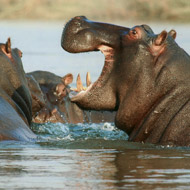
Born Free calls for presidential inquiry
Plans to cull thousands of hippos over five years in the Luangwa Valley, Africa, are back on again, according to the Born Free Foundation.
The organisation say that two thousand hippos ‘face the renewed threat of terror and death’ following a recent meeting called by the Department of National Parks and Wildlife (DNPW).
The cull was suspended in June following the huge opposition that was widely reported in the media.
However, after a brief ‘invitation-only’ meeting in Lusaka, it now appears that the cull is set to resume. Why the DNPW has taken this decision, and on what basis, is shrouded in secrecy.
In light of the news, Born Free wrote to the President of Zambia requesting the cull to be abandoned and that key information relating to DNPW’s justifications for the cull to be made publicly available. But to date, a response has not been received.
“The longer these vitally important issues go unanswered, the more the authorities come up with different and, as yet, unsubstantiated justifications for the cull,” said Will Travers, president and CEO of Born Free Foundation.
The five-year-culling exercise, which began in May, was first reported as a ‘wildlife management tool’ to prevent the spread of anthrax.
But in a statement on 14 June, the DNPW said the river levels and water flow in the Luangwa river were abnormally low and insufficient to support the hippo population.
"The independent inquiry, called for by Born Free, seems to me the only way to establish the truth and determine whether any of the claimed justifications for the cull - a measure which could see 2,000 wild hippos lose their lives - can withstand the scrutiny they deserve," said Mr. Travers.



 The Veterinary Medicines Directorate (VMD) is inviting applications from veterinary students to attend a one-week extramural studies (EMS) placement in July 2026.
The Veterinary Medicines Directorate (VMD) is inviting applications from veterinary students to attend a one-week extramural studies (EMS) placement in July 2026.